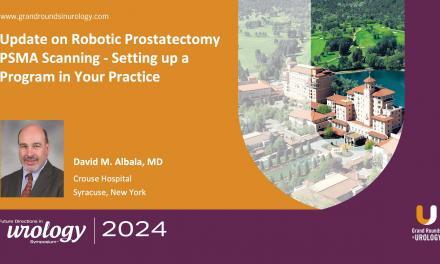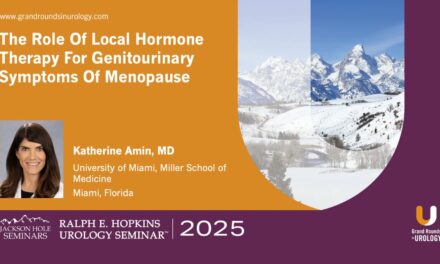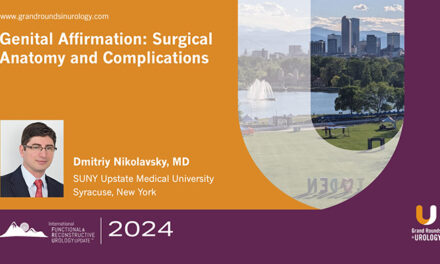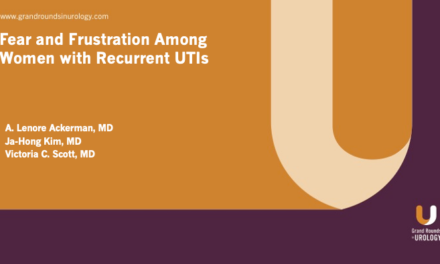Fergus Coakley, MD, presented “Optimizing MRI Techniques for Prostate Cancer Diagnosis” during the 8th Global Summit on Precision Diagnosis and Treatment of Prostate Cancer on October 8, 2024.
How to cite: Coakley, Fergus. “Optimizing MRI Techniques for Prostate Cancer Diagnosis.” October 8, 2024. Accessed Mar 2025. https://grandroundsinurology.com/optimizing-mri-techniques-for-prostate-cancer-diagnosis/
Optimizing MRI Techniques for Prostate Cancer Diagnosis – Summary
Fergus Coakley, MD, Portland Health and Science University, Portland, Oregon, delivers a 10-minute presentation on optimizing MRI for prostate cancer diagnosis, addressing key shifts in diagnostic paradigms. He explains the transition from systematic biopsies following PSA screening to a targeted approach using multiparametric MRI (mpMRI) and in-bore biopsies. He highlights the superior signal-to-noise ratio of endorectal coils, emphasizing their role in enhancing tumor detection and staging. Through case studies, Dr. Coakley demonstrates the efficacy of high-quality MRI in identifying clinically significant cancers that were missed by traditional methods. Data supporting targeted-only biopsies for positive MRI findings are presented, with discussions on the low yield and increased complications of systematic sampling. Dr. Coakley challenges conventional views on multifocality and secondary foci, showing minimal impact on prognosis. He urges the adoption of advanced MRI-guided techniques while acknowledging the need for further research. This insightful presentation invites viewers to explore evolving strategies in prostate cancer diagnostics and their implications for patient outcomes.
The Global Summit on Precision Diagnosis and Treatment of Prostate Cancer is a unique multi-disciplinary forum organized to inform the key health care stakeholders about the emerging advances in clinical case and research and create a consensus-based vision for the future of precision care and educational and research strategy for its realization. The mission of the Summit is to fill the currently existing gap between the key experts of in vivo imaging, the world authorities in the in vitro fluid- and tissue-based molecular diagnostics, including genomics, and thought leaders in the development of novel observation strategies (e.g., active surveillance, or AS) and therapeutic interventions.
ABOUT THE AUTHOR
Dr. Coakley is the chair of Diagnostic Radiology. He joined OHSU in August 2012 from the University of California, San Francisco (UCSF) where he was a professor in residence in the Department of Radiology and Biomedical Imaging in the UCSF School of Medicine. He was also chief of the Abdominal Imaging Section and vice chair for Clinical Services in the Department of Radiology and Biomedical Imaging.
Dr. Coakley received his medical degree in 1988 from the School of Medicine, University College Cork, Ireland. His postgraduate training includes an internship at Mercy Hospital in Cork, medical residency at Mater and St. Vincent’s Hospitals in Dublin, and radiology residency at Leicester teaching Hospitals in Leicester, England. Dr. Coakley was a fellow in body imaging at Memorial Sloan-Kettering Cancer Center before joining UCSF in 1997. During a year away from UCSF in 2000–2001, he was assistant professor and director, body MRI, at Memorial Sloan-Kettering and Weill Medical College of Cornell University.
Dr. Coakley is an active clinician, teacher and researcher. He is involved in teaching at all levels, from medical students to postgraduate trainees. As Chair, he has worked to build productive teams, conduct successful recruitment, and develop a positive and equitable culture within the department. Since 2016, his research work has centered on developing a system that would allow for integrated endorectal MRI and in-bore targeted biopsy of the prostate, including the establishment of a small medical device company as an OHSU spin-off to attract small business grant funding. This reflects his longstanding interested in prostate cancer imaging and diagnosis. As a teacher, he finds educating the next generation of doctors to be both rewarding and stimulating, and is committed to involving young physicians in research.




